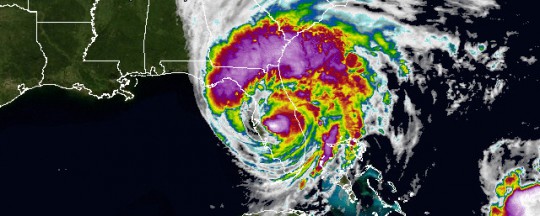State Irma Losses Top $6.55 Billion; 212 Claims In Escambia County
December 19, 2017
Estimated insured losses from Hurricane Irma have topped $6.55 billion, with the number of claims approaching 866,000, according to information released Monday by the state Office of Insurance Regulation.
The latest report showed that 865,974 claims from the September storm had been filed with insurance companies as of Friday, with 719,512 involving residential properties.
While people have several years to file claims, the numbers indicate a slowing in reported damages, as numbers posted by the state office on Dec. 4 showed 853,356 claims with estimated losses of $6.3 billion.
In Escambia County, 212 claims were filed. Of those, 103 were paid, 71 were closed without payment and 38 remain open.
Lynne McChristian, spokeswoman for the Insurance Information Institute, said Irma could have been “much worse” for homeowners and the industry.
“The insurance companies have been well-capitalized,” McChristian said. “They have been waiting for this. There may be some claims that will continue to be filed, but insurance companies know that this is what happens when you are dealing with Florida’s hurricane risk.”
While figures are not available from individual private insurers, state-backed Citizens Property Insurance reported last week it had received 63,500 claims from Irma. Most were in Miami-Dade, Broward and Monroe counties.
Citizens anticipated its number of Irma claims will grow to 70,000, with $1.2 billion in damages, over the next year.
Citizens President and CEO Barry Gilway also said Wednesday that he expected the storm to increase Citizens’ policy count from “about 442,000 policies back up to 500,000” in the next year.
In the overall industry, Miami-Dade County has the largest number of Irma-related claims, with 114,078 as of Friday, according to the Office of Insurance Regulation numbers. Other counties with large numbers of claims included Broward, 71,970; Orange, 68,306; Lee, 65,311; Collier, 63,644; and Polk, 50,180.
Irma made landfall Sept. 10 in Monroe and Collier counties, causing widespread destruction and at least 84 deaths in Florida. The insurance industry has closed 48 percent of Irma claims with some payment. Another 31 percent were closed without any payments.
In most cases where money did not change hands, the damages failed to meet policyholders’ deductibles, McChristian said.
To reduce risk in Florida, the House Select Committee on Hurricane Response and Preparedness has received a number of potential housing changes — as part of the more than 140 recommendations — for lawmakers to consider during the 2018 legislative session, which begins in January.
Among the proposals, Rep. Holly Raschein, R-Key Largo, suggested the state identify areas where rebuilding after disasters might be high-risk and to consider options for not rebuilding, including the possible purchase of the properties. The land, she suggested, would be used to create additional open space and natural buffers.
Meanwhile, Sen. Annette Taddeo, D-Miami, and House Minority Leader Janet Cruz, D-Tampa, introduced a proposal (SB 1282 and HB 1011) last week that would require insurance companies to disclose to homeowners when coverage lacks flood insurance.
“I’ve met many constituents who had no idea that their hurricane coverage did not include protections when their homes flooded,” Taddeo said in a prepared statement. “This is especially problematic in South Florida as we face sea level rise and stronger storm surges from climate change.”
by The News Service of Florida with contribution from NorthEscambia.com




Comments